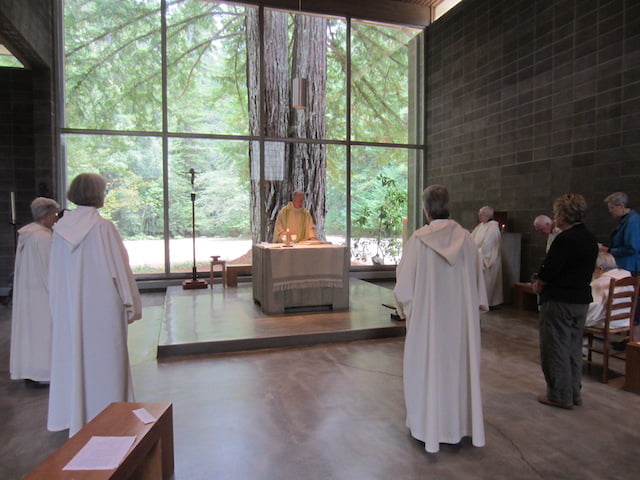Chapter Talk – Fourth Sunday of Easter – May 3, 2020, cycle-A
I begin with these words of Thomas Merton: “Prayer itself is obedience. Our deepest obedience takes place when we pray. Prayer is an act of surrender; it is essentially an act of surrender to God’s love” (quoted in: Shaped By the End You Live For, Bonnie Thurston, p.73). These words of Merton were written at the end of his life and should give us great pause for reflection. What does it mean that ‘our deepest obedience’ happens when we pray’? The implication of these words of Merton on prayer are far-reaching. Prayer is ‘obedience’ because it is a surrender, a continual surrender to God’s love. It roots us in Christ’s life, in his total surrender to God’s will. Within this ambience of prayer as obedience, prayer as surrender, it extends to living our obedience not only to God but also to one another. Last Wednesday and Thursday we read chapters 72 and 73 from the Rule of St. Benedict. The theme of Chapter 71 is on ‘mutual obedience’ and this theme is again noted by Benedict in chapter 72 where he states: “They should even be ready to outdo each other in mutual obedience so that no one in the monastery aims at personal advantage but is rather concerned for the good of others” (72:6-7, translation by Patrick Berry, osb).
In Unit #1 of the Experientia material, that we have started to read and share together, Abbot Bernardo Bonowitz in his essay tells us that for the early Cistercians, the experience of God rested on two realities: that God loved us first, that God’s love is the basis of the Divine-human relationship. And the second reality is that the experience of God was not some private, isolated affair; it happened within the context of a community of relations. He writes: “One of the most interesting insights of the Cistercian fathers is that the experience of God never occurs in isolation but is always related to an experience of oneself, an experience of the neighbor and an experience of community” (p.14). All this brings us back to the text from Merton that I began with: in contemplative prayer, we surrender to the silence, we surrender in order to listen, we surrender in order to receive God’s word, a word that is ‘alive and active’ (Heb 4:12), a word that cuts through our doubts, our murmurings, our conflicts, our hurts, our disappointments and so on. We all know that ‘listening’ is the main ingredient in the meaning of the word ‘obedience’, ob-audire in Latin. To see ‘obedience’ as prayer gives us an important perspective and context for when we pray.
This Sunday is ‘Vocation Sunday’. A vocation is a long-term, life’s venture, and it normally has many twists and turns. In what way did we each ‘hear’ the call from God or how did we experience God’s call? What was the process of how we came to say ‘yes’? The root meaning of the word ‘vocation’ is a ‘call’; it means to be addressed by God. That call is most often heard in the silence of the heart. One’s ‘yes’ is obedience, obedience to the ‘call’. Can we not see Jesus’ whole life as prayer, prayer in the form of ‘obedience’?
To repeat: our deepest ‘obedience’ is when we pray. This is profoundly seen in Jesus’ prayer at the garden of Gethsemane. In this encounter, which is an exchange of love, Jesus prays to his Abba that ‘this cup would pass him by…but not my will but your will’ (Mt 26:39). We do not hear God’s reply to Jesus, but Jesus is there, fully present and listening. He is there on the ground in the disposition of ‘surrender’….And he follows what he has heard. This encounter at Gethsemane is the culmination of Jesus’ vocation before he returns to his Abba. For us to continue to live the ‘yes’ of our vocation is to keep in mind and heart that our daily prayer is obedience, a prayer of surrender…we are present in prayer to hear God…Indeed, we bring our longings, our needs and then surrender them to the loving heart of God…We step aside interiorly and listen. For each of us to fulfill our ‘call’, we must not run away from this word ‘surrender’, which I have used multiple times in this talk. So much of our daily lives is filled with our words inside ourselves and outside with one another. What if in prayer we would be silent and surrender more? This would build up God’s life and love within us, beyond our imaginings. Through experiencing prayer as obedience, we would not lose sight of our vocation, our call from God…and we would be more willing, each day, to offer our flesh and blood for one another, and for the life of the world.
Sr. Kathy DeVico


